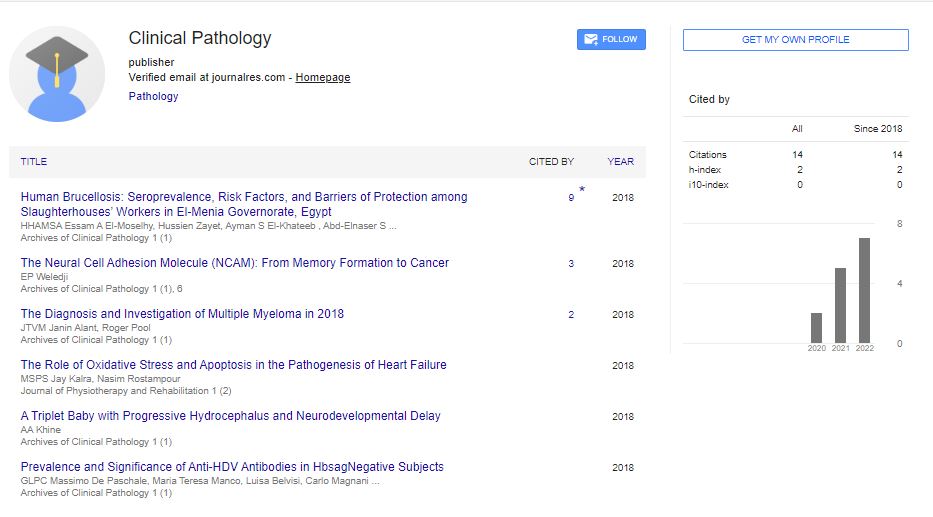Commentary, Arch Clin Pathol Vol: 6 Issue: 4
Precision Medicine and Safety Science: Molecular Diagnostics and Toxicology in Modern Health
Robert Kelvin*
1Department of Pathology, Kocaeli University, Kocaeli, Turkey
*Corresponding Author: Robert Kelvin,
Department of Pathology, Kocaeli
University, Kocaeli, Turkey
E-mail: kelvinrobert@gmail.com
Received date: 27 November, 2023, Manuscript No. ACPY-24-124234;
Editor assigned date: 29 November, 2023, PreQC No. ACPY-24-124234 (PQ);
Reviewed date: 13 December, 2023, QC No. ACPY-24-124234;
Revised date: 21 December, 2023, Manuscript No. ACPY-24-124234 (R);
Published date: 29 December, 2023 DOI: 10.4172/acpy.100098
Citation: Kelvin R (2023) Precision Medicine and Safety Science: Molecular Diagnostics and Toxicology in Modern Health. Arch Clin Pathol 6:4.
Description
Molecular diagnostics and toxicology represent critical fields at the forefront of medical science, employing advanced molecular techniques to identify, analyze, and understand diseases and toxic exposures at the molecular level. Molecular diagnostics focus on analyzing nucleic acids, proteins, and other molecular markers to diagnose diseases, predict patient responses to treatments, and guide therapeutic strategies. Techniques such as Polymerase Chain Reaction (PCR), nucleic acid amplification, and sequencing technologies enable the detection of genetic mutations, variations, and pathogen nucleic acids.
Diagnostic tests assess genetic alterations associated with hereditary diseases, infectious agents, cancer biomarkers, and pharmacogenomics, providing valuable insights into disease etiology and personalized treatment approaches. The integration of molecular assays into clinical practice enhances diagnostic accuracy, prognostication, and therapeutic decision-making.
Role in disease diagnosis and management
Molecular diagnostics revolutionizes disease diagnosis and patient care across various medical specialties. In infectious diseases, molecular testing enables the rapid and accurate identification of pathogens, aiding in the timely initiation of targeted treatments and infection control measures.
In oncology, molecular profiling of tumors helps classify cancer types, predict prognosis, and identify specific mutations or biomarkers guiding targeted therapies. Pharmacogenomics evaluates genetic variants influencing drug metabolism, assisting in determining optimal drug selection and dosing to maximize therapeutic efficacy while minimizing adverse effects.
Fundamentals of toxicology
Toxicology involves studying the adverse effects of chemicals, drugs, toxins, and environmental pollutants on biological systems. Analytical techniques like Gas Chromatography-Mass Spectrometry (GC-MS), Liquid Chromatography-Mass Spectrometry (LC-MS), and immunoassays detect and quantify toxic substances in biological samples.
Toxicological analyses aid in identifying drug overdoses, exposure to environmental toxins, workplace-related exposures, and determining the cause of poisoning or fatalities. Understanding toxicokinetics and toxicodynamics helps elucidate mechanisms of toxicity and informs medical interventions and public health policies.
Role in poisoning and toxic exposure
Molecular toxicology plays a crucial role in diagnosing and managing poisoning cases, drug overdoses, and toxic exposures. Toxicological screens detect substances such as drugs, alcohol, heavy metals, pesticides, and toxins, aiding in identifying the cause of intoxication or adverse effects.
In forensic investigations, toxicological analyses provide crucial evidence in cases of suspected poisoning, drug-related deaths, or accidental exposures. Identifying toxic substances and their concentrations assists medical professionals and law enforcement agencies in understanding the circumstances surrounding toxic events.
Emerging trends and innovations
Advancements in molecular diagnostics and toxicology continue to shape the fields with innovative technologies and approaches. Pointof- care testing and miniaturized devices enhance rapid diagnostic capabilities, allowing on-site molecular testing for infectious diseases, drug screening, and toxicological analyses.
Omics technologies, including metabolomics, proteomics, and transcriptomics, offer comprehensive molecular profiling, elucidating complex biological responses to toxins or diseases. These approaches aid in biomarker discovery, disease stratification, and identifying novel therapeutic targets.
Challenges and future directions
Challenges in molecular diagnostics and toxicology include assay standardization, data interpretation, and managing the vast amount of molecular data generated. Ensuring test accuracy, reliability, and reproducibility remain critical in implementing molecular assays in clinical and toxicological practice.
The future of molecular diagnostics and toxicology involves refining precision medicine approaches, integrating multi-omics data, and enhancing data analytics to translate molecular information into actionable clinical insights. Collaboration among scientists, clinicians, regulatory bodies, and technological innovators is essential for advancing these fields and improving patient care.
Conclusion
Molecular diagnostics and toxicology stand as integral pillars in modern healthcare and forensic investigations. Their methodologies, ranging from advanced molecular assays to toxicological analyses, continue to drive innovations in diagnostics, therapeutics, and public health initiatives. With ongoing technological advancements and collaborative efforts, molecular diagnostics and toxicology is to enhance disease detection, management, and environmental safety in the evolving landscape of medical science.
 Spanish
Spanish  Chinese
Chinese  Russian
Russian  German
German  French
French  Japanese
Japanese  Portuguese
Portuguese  Hindi
Hindi 